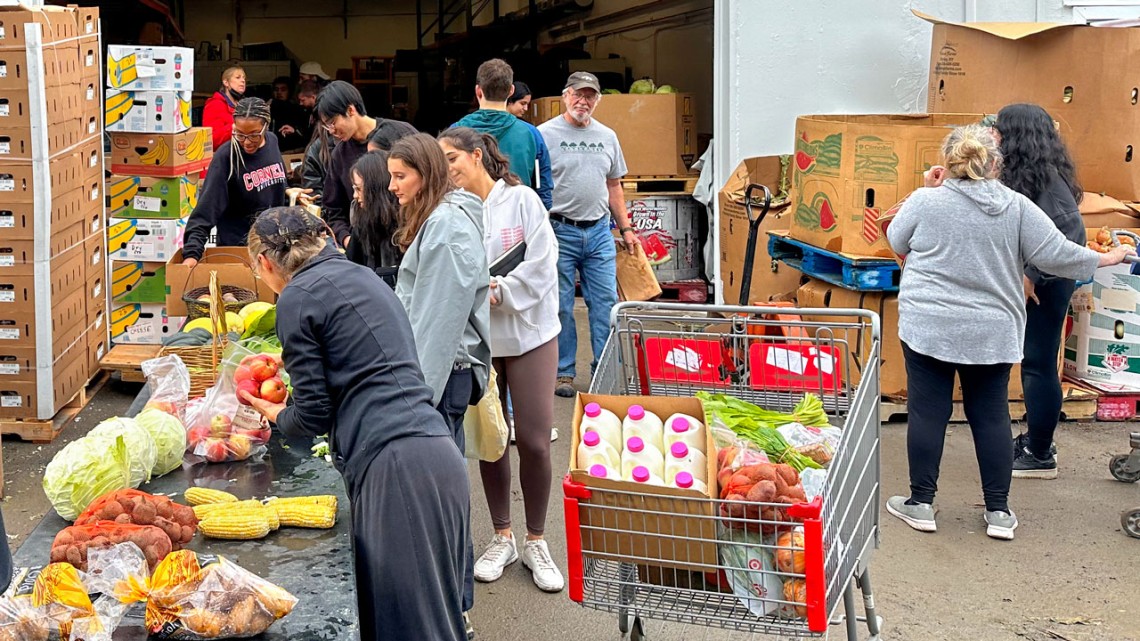
Architecture students volunteer at the Enfield Food Distribution Center. The visit served as participatory research for their speculative design projects.
Community-engaged research gets boost from new grants
By Ashlee McGandy
A multidisciplinary project to design a new facility and community garden for the Enfield Food Distribution Center – which has seen demand skyrocket since 2020 – is among eight teams of Cornell faculty, students and community partners to receive Engaged Research Grants from the Einhorn Center for Community Engagement.
Totaling more than $180,000, the grants support undergraduate participation in faculty- and staff-led research that is helping to build a more sustainable, just and collaborative future.
“Cornell’s three pillars of learning, discovery and engagement come to life through community-engaged research,” said Basil Safi, executive director of the Einhorn Center. “Students get the opportunity to work on rigorous research that is uncovering new knowledge while contributing to meaningful projects that lead to positive change in communities throughout the world.”
Since 2015, the Einhorn Center has awarded nearly 100 grants to increase student involvement on community-engaged research teams from Ithaca to Ecuador to Malawi. Through these experiences – which span every Cornell college and school – students learn to collaborate with diverse teams, apply analytical and critical-reflection skills and contribute to the public good.
A team from three Cornell colleges is collaborating with Jean Owens, director of the Enfield Food Distribution Center (EFDC), which currently serves more than 600 households weekly with the help of 40 volunteers. Its current building is not set up to meet this growing demand, and EFDC wants to expand its operations to a new facility and community gardens that can serve as a central hub for the food pantry, community meals and nutrition education.
“I’m excited to work with this team to develop new programs and facilities to improve access to food, nutrition and health information and community gardens,” said Laurie Miller, senior lecturer and associate director for public engagement in the Master of Public Administration Program at the Cornell Jeb E. Brooks School of Public Policy, who is the faculty lead on the project. “The Engaged Research Grant funding will support opportunities for more students to work collaboratively with EFDC and increase the exchange of ideas across disciplines.”
Undergraduates in engineering and architecture courses and professional students from an MPA capstone course will work with EFDC to address operational challenges and design the new facility. The students are led by Miller, David Goldberg, associate professor in Cornell Engineering, and Hanna Tulis, lecturer in the College of Architecture, Art and Planning.
“I’m particularly excited by research projects like this that are being embedded into new community-engaged learning courses,” Safi said. “We’re seeing more and more faculty across the university bridging this important research-teaching divide.”
Engaged Research in Conservation Medicine, another funded project, links community partners in Africa and Asia with Cornell researchers to address the decline and endangerment of wild species and wild places. A decade ago this team integrated students into research that trains the next generation of conservation medicine leaders and helps build capacity of local scientists and communities. This year’s funding will support a student peer-mentorship model, expand upon past research and establish the long-term sustainability of the program.
Other 2024 Engaged Research Grants recipients are:
- Cornell EcoArts: A community-engaged research and teaching program integrating art, culture and the environment;
- Engineers of Tomorrow: Mentoring pre-college students in Syracuse;
- Improving Community Health and Wellness: A cross-cultural collaborative design project among Cornell and Tuskegee University students;
- Public Use and Perception of Ponds: Integrating natural science and social science research;
- Reimagining Medicine Against Climate Change: Designs for land-based learning, research and healing in a Tanzanian teaching hospital; and
- Research on Old-Growth Grasslands: Linking students with stakeholders to restore degraded North American agricultural grasslands.
Ashlee McGandy is assistant director of communications for the Einhorn Center for Community Engagement.
Media Contact
Get Cornell news delivered right to your inbox.
Subscribe
